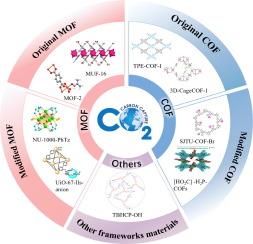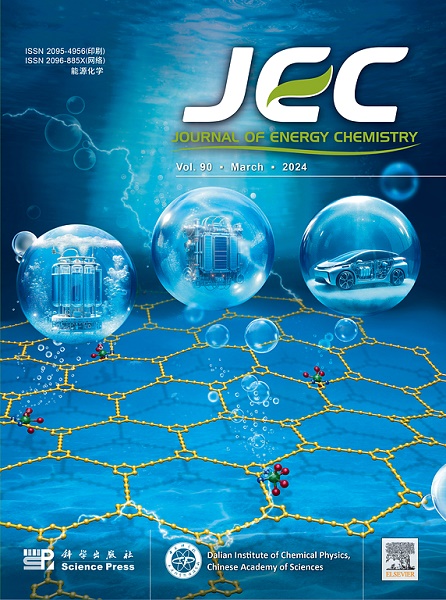Porous framework materials for CO2 capture
IF 13.1
1区 化学
Q1 Energy
引用次数: 0
Abstract
Due to the significant impact of carbon dioxide on global ecology, more efforts have been put into the exploration on CO2 capture and utilization. Porous organic framework materials, as a kind of materials with high porosity and designable structure, have been considered as effective host materials for adsorbing carbon dioxide or separating it from other gases. This review gives a deep insight into the applications of metal-organic frameworks, covalent-organic frameworks, and other porous frameworks on CO2 capture, focusing on the enhanced capture performances originated from their high surface area with abundant porous structure, functional groups with specific heteroatoms modification, or other building unit interactions. Besides, the main challenges associated with porous frameworks for CO2 capture and proposed strategies to address these obstacles, including the structural design strategy or the capture mechanism exploration, have been demonstrated and emphasized. This review can contribute to further investigation on porous frameworks for gas capture and separation with enhanced performance and efficiency.

用于捕获二氧化碳的多孔框架材料
由于二氧化碳对全球生态环境的重大影响,人们加大了对二氧化碳捕获和利用的探索力度。多孔有机框架材料作为一种具有高孔隙率和可设计结构的材料,被认为是吸附二氧化碳或将其与其他气体分离的有效宿主材料。本综述深入探讨了金属-有机框架、共价-有机框架和其他多孔框架在二氧化碳捕集方面的应用,重点关注其丰富多孔结构的高比表面积、特定杂原子修饰的官能团或其他构建单元相互作用所带来的捕集性能提升。此外,还论证并强调了多孔框架在二氧化碳捕集方面面临的主要挑战,以及解决这些障碍的建议策略,包括结构设计策略或捕集机理探索。本综述有助于进一步研究用于气体捕获和分离的多孔框架,从而提高其性能和效率。
本文章由计算机程序翻译,如有差异,请以英文原文为准。
求助全文
约1分钟内获得全文
求助全文
来源期刊

Journal of Energy Chemistry
CHEMISTRY, APPLIED-CHEMISTRY, PHYSICAL
CiteScore
19.10
自引率
8.40%
发文量
3631
审稿时长
15 days
期刊介绍:
The Journal of Energy Chemistry, the official publication of Science Press and the Dalian Institute of Chemical Physics, Chinese Academy of Sciences, serves as a platform for reporting creative research and innovative applications in energy chemistry. It mainly reports on creative researches and innovative applications of chemical conversions of fossil energy, carbon dioxide, electrochemical energy and hydrogen energy, as well as the conversions of biomass and solar energy related with chemical issues to promote academic exchanges in the field of energy chemistry and to accelerate the exploration, research and development of energy science and technologies.
This journal focuses on original research papers covering various topics within energy chemistry worldwide, including:
Optimized utilization of fossil energy
Hydrogen energy
Conversion and storage of electrochemical energy
Capture, storage, and chemical conversion of carbon dioxide
Materials and nanotechnologies for energy conversion and storage
Chemistry in biomass conversion
Chemistry in the utilization of solar energy
 求助内容:
求助内容: 应助结果提醒方式:
应助结果提醒方式:


